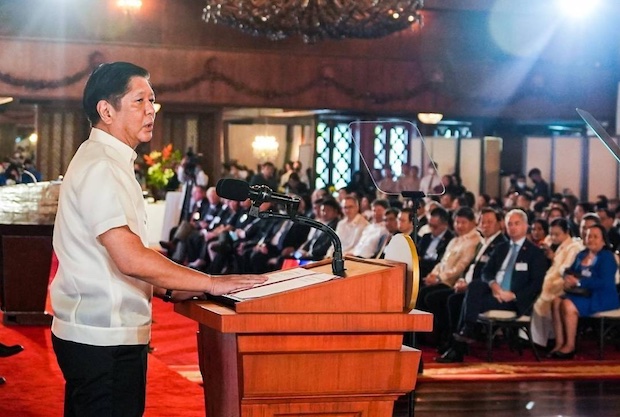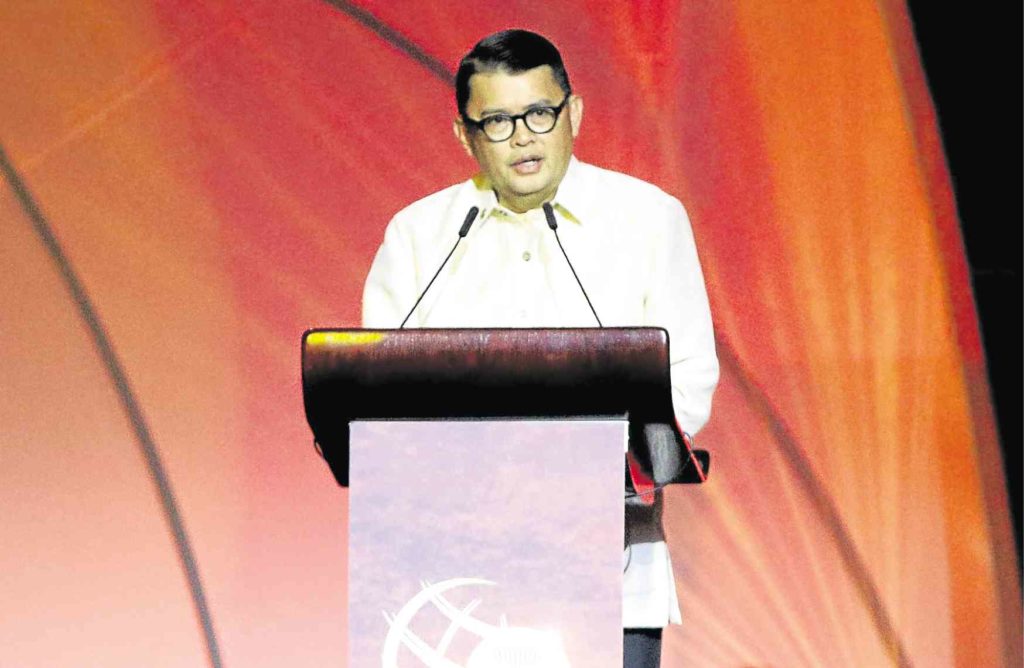
President Ferdinand Marcos Jr. delivered a speech at the KALAP signing ceremony,in which he was a witness, on Monday, March 6, 2023. (Photo from the Presidential Communications Office)
MANILA, Philippines — Small farmers can now tap into the value chain of big agriculture firms through Go Negosyo’s Kapatid Angat Lahat Agri Program (KALAP).
Go Negosyo, led by founder Joey Concepcion, just signed last Monday memorandums of agreement and memorandums of understanding with several government agencies at the Ceremonial Hall of Malacañang with President Ferdinand Marcos Jr. as a witness.
Explaining how KALAP aims to help small farmers, Concepcion said: “It is the platform where we hope to employ as many Filipinos as possible, and it will do so where our job creation efforts can have the most impact: in the agriculture sector.”
“KALAP is public-private partnership at work, and perhaps the most important PPP that we will undertake,” he added.
Following Go Negosyo’s advocacy, KALAP aims to provide micro, small, and medium enterprises (MSMEs) access to the three M’s necessary for entrepreneurship to succeed — mentorship, access to money, and a market.

Joey Concepcion, founder of Go Negosyo. (INQUIRER FILE PHOTO)
In his speech, President Marcos stressed the role of big corporations in boosting the growth of small farmers.
”No one sector can manage it by itself,” he said. “[Private sector help] enable MSMEs to become profitable, sustainable, and globally competitive.”
He also stressed the importance of giving back profit to the farmers, saying: “In the end, this is about giving a decent living to our farmers, so they can live by the virtue of their hard work.”
The following are the government signatories to the Go Negosyo program:
- Department of Agriculture
- Department of the Interior and Local Government
- Department of Environment and Natural Resources
- Department of Trade and Industry
- National Commission on Indigenous Peoples
- National Irrigation Administration
- Philippine Coconut Authority
- National Tobacco Administration
Former Agriculture Secretary William Dar is now a senior adviser to KALAP.
According to its proponents, KALAP aims to promote inclusive growth, sustainability, competitiveness, and development in the Philippines by leveraging the potential of MSMEs, small-holder farmers, and fisherfolk.
KALAP will focus on primary agricultural commodities and industries — namely rice, coconut, tobacco, coffee, cacao, sugarcane, corn, feeds, and livestock.
KALAP aims to do this in partnership with large firms — “big brother” companies — and with the participation of the government to provide the enabling environment in a collaborative whole-of-nation approach.
KALAP is part of the larger Kapatid Angat Lahat initiative, which was first conceived by Go Negosyo in 2016.
Some of the biggest companies in the Philippines and most of the largest business organizations have pledged their support for Kapatid Angat Lahat and renewed their commitment at the MSME Summit in August last year.
Model for KALAP
During the ceremonial signing at Malacañang, Christian Eyde Moeller, CEO and co-founder of Lionheart Farms, presented his model for sustainable transformation for KALAP.
The model included focusing on productivity and upskilling farmers, as well as improving both income and output.
Lionheart Farms has successfully implemented its inclusive model in coconut farming in Palawan.
One of the farmers who benefited from this model was 98-year-old Maman Buano Layom, who was present at the Malacañang ceremony.
Layom was a former kaingin farmer and a member of the indigenous Tau’t Bato community of Palawan.
Inclusive and sustainable models have been implemented by other companies, such as Universal Leaf Philippines in the Ilocos Region.
It was among the first to become big-brother companies, along with SL Agritech, Bounty Fresh, The LT Group, Yovel East Research Devt. Corp., Kennemer Foods, Nestlé, Central Azucarera de Tarlac, and Metro Pacific Agroventures.
Significant sector
As of December 2022, the agriculture sector accounted for nearly a quarter of the total number of jobs nationwide — or 11.76 million, according to the Labor Force Survey of the Philippine Statistics Authority.
The DTI meanwhile, estimates that MSMEs generate as much as 65 percent of jobs.
“It is in agriculture that we find a large number of the micro-entrepreneurs – the micro farmers, and it is they who need the most help. It is in this sector where a multiplier effect of jobs and enterprises, growth in communities away from the urban centers, can happen, Concepcion said.

